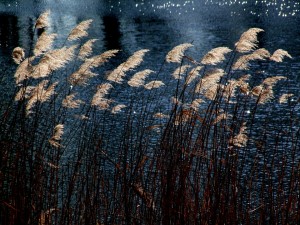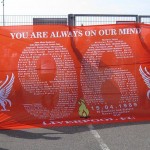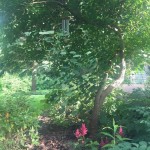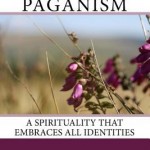by Sarah Sadie and Yvonne Aburrow
Sarah and Yvonne decided to write a different kind of blogpost – a conversation. Since we are both poets, we had a conversation about poetry.

Yvonne: For me, a poem starts to build up like a pressure inside me, and then it bursts like a bubble and I get the first few lines and start writing, and then it all comes out in a big rush. Later, I start to refine it, rearranging the lines here and there – but most of my editing is pretty light after the first rush.
What’s your experience?
Sarah: This is what I love about conversations–my process is almost completely different from yours! For me, I will sense a moment–almost like a scent or texture to the day, the hour, that brushes my skin like a spider web…and I have to try to catch at whatever that moment is, put it down on the page in language. It really does feel like having a seventh or eighth sense, in a way. A poem can be just one of those–or sometimes it is a series or combination, that I build over time ,editing lines, switching stanzas around. I work it along for a number of days or weeks…and when I can’t take it any further (Plath: “I simply cannot see where there is to get to”) I set the draft aside for a couple of months. By the time I pull it out I’ve mostly forgotten it and the fresh reading shows me where the trouble spots, the faultlines are.
Do you try to write poetry regularly, to keep yourself searching for that sense of “pressure” or do you wait for it to come to you?
Yvonne: That’s a fascinating process. I often write small pieces of prose in response to the beauty I see all around me, and I suppose those could get turned into poems, and I think that’s my “poetic eye” responding to the world. I used to write poetry more frequently – but lately I’ve been more focused on writing prose. I once wrote a poem about my process where I likened it to the bends – bubbles rising from the depths. Perhaps my process has changed and I need to discover what the new process is.
I do write poetry for ritual and that tends to be more “written to order” (and create spoken poetry extempore in ritual) but even that has waned of late. Maybe I should stop waiting for it to come to me, and seek out the Muse a bit more actively. I have a fairly strong image of my muse – a dark man who lives in a cave (probably also my animus).
Do you feel that you have a Muse?
Sarah: Before I answer that question… 😉
I really like the word you use above : response. Because poetry (by extension, any art) is a response, it is part of a conversation between the writer and the larger world–and just writing that I realize how much our writing is a form of listening. And we have a response-ability that can grow, shift, change as we do over the years. When you say “Perhaps my process has changed and I need to discover what the new process is” I shout YES–with two new books out this year, I feel I’ve tapped out a bit. Need to open to the next thing.
A book of poems feels like an album to me–Prince’s death (and Bowie’s, before that) have me thinking about similarities between how I feel about creating a book and how they created albums. There are the individual songs, and then there is the overall vision–the sum is greater than the individual parts. Beyonce’s Lemonade is an immediate contemporary example as well. (btw, isn’t it fascinating how people are picking up on the polytheist content of Lemonade).
In the years that I was Poet Laureate of Madison, Wisconsin, I also wrote poems to order and I found it–at that time in my writing life–a welcome challenge. The City gave awesome and random writing prompts (the rededication of a replica Statue of Liberty; a poem to introduce a political scientist who specializes in polling procedures; a poem for Obihiro, Japan among others)–and deadlines to boot!
Poems and spellwork are very closely related. Very, very closely, imo. So are poems and theology, for that matter.
As for my muse–yes, I have one. Also male (I would love to see an anthology of women (and men) writing about and to their male muses. It’s about time to balance the record on this). He is a reclusive character–I only catch glimpses once in a while. Just as often, I am writing to particular friends or family members–a poem sometimes (often) feels like an old-fashioned letter, to me.
I’m extremely restless with myself as a writer these days…to be a text artist in a visual age is not easy. I’m trying to understand where I go next–it feels very much like walking blind through thorns, at the moment.
What about you? Do you have a next writing project you’re launching into?
Yvonne: Yes, I’m currently working on a book about the inner work of witchcraft (that’s the working subtitle). There will be a fair amount about embodied spirituality and responding to Nature, as well as energy work, how the circle is a microcosm, visualisation, meditation, and so on.
I was interested by what you said about being a text writer in a visual age. I suppose we can take some comfort from the way that poetry is the most visual form of writing. I also know one poet who illustrates his work with photo-collages. And then there was Kahlil Gibran, who accompanied his poems with his own drawings. I was never quite sure how the drawing related to the poem, but it was interesting.
I completely agree that poetry is related to theology and magic; they use the same twilight mode of consciousness. Spells and ritual words often take the form of poetry – Doreen Valiente was very good at that. I wish people would study a little and find out about different meters and poetic devices such as assonance and the caesura though. And theology is sometimes poetic (and ought to be more often). Alison Leigh Lilly springs to mind as someone who writes poetic theology. I think also that poets, like comedians, see connections that others have missed. Both comedy and poetry are sacred arts, showing the world hidden connections and undercurrents.
Is that what you had in mind?
Sarah: Wasn’t it Victor Anderson who said that “White magic is poetry. Black magic is anything that works.” ? I agree completely that people who write spells and rituals as poetry would do well to study the craft–it is an aspect of craft like any other and the more adept you are, the stronger your ritual will be.
I also really like what Seamus Heaney wrote (I’m paraphrasing here and not doing it full justice, but the idea comes across): that a poem is like the paper bird we tape in the picture window–it’s not a real bird, but it causes the birds outside to veer their course. A poem isn’t “real life”–but it can cause us to swerve a bit. It has an effect. An impact.
It may be that poetry is as close to my religion as any recognized Pagan tradition. And I’m okay with that.
Great conversation–thank you!
Yvonne: Poetry as religion – I’ll drink to that! For me it is a sacred vocation, and one that no-one can take away from me. One is a witch in community, one has a job title conferred by an employer: but one can be a poet without approval or sanction from anyone else. Even a child writing their first poems may call themselves a poet. I love that.
And poetry as magic: definitely! A poem can transform your perspective and perceptions, it can be an incantation (did you ever hear Yeats reading The Lake Isle of Innisfree? It’s like he’s reading a spell), it can be an invocation to change the world.












